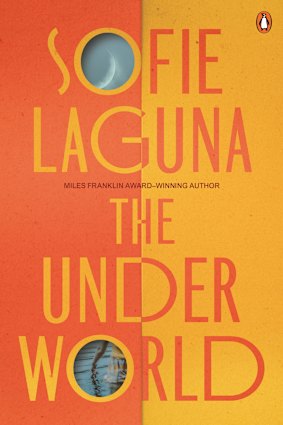
While she demurs at using that description now, she clearly has a deep attachment to Martha. “She has a palpable presence outside myself, which is strange,” she says. “I can conjure her up in this conversation now, as I’m recounting the way she used to be. I can feel her again but [now the book is finished], my natural inclination is to move away. I don’t want her hearing that; I feel guilty saying that.”
Martha was originally conceived to serve a purpose: Laguna was writing about a different character, a man, and needed a woman to encounter him.
She discovered her while she was watching her son in a basketball training session in a high-school gym. She started writing a monologue from the perspective of that female character.
“The voice came out with incredible energy, as if keeping up with the balls that were being slammed. And she poured out the story of childhood and education and scholarship and academia and betrayal and from the point of view of an adult voice. It was furious, funny, very clever, all during skills and drills. I was writing it down as fast as I could go,” she says.
“And then the whistle blew, balls were put down, pen was put down. I knew something had happened. I knew that was a rare writing experience, but it had been intensified by the nature of my surroundings.”
When she got home, she realised that her original character – he’d been picked up and put down many times over the past 20 years – had to make way again, this time for Martha.
Loading
“This had come from a place in me that had a lot to say, and I hadn’t worked with this part before. I couldn’t turn away from it. And when you begin a new work, you have to decide, at what point in their life do I begin? What is the story I need to tell in which we know their life?”
She has been described as a writer for young adults, but says that is incorrect. She has written in voices that are young but never really explored the coming of that crucial transitional time. “I really didn’t think I was interested in it, and I discovered that through Martha, there’s a lot to say, to think, to feel and express.”
The Underworld was, she says, more difficult to write than her previous books, perhaps because the world of Martha is not that different from her own school days – boarding school, lonely until she found a group of firm friends, studying Latin, in particular. “It was very establishment and my family was unconventional, and so I was an outsider who did find her way eventually, and when I did, it was a home.”
Her earlier main characters came from more hardscrabble circumstances but with those novels, she found within three months she was off and running with the story; with The Underworld, she was plagued by doubts and vulnerabilities. For the first time, she says, she didn’t have a bird’s-eye view of what she was writing that allowed her to master the narrative.
As she wrote, the significance that Latin had served for her at school resurfaced from her own unconscious. She hadn’t realised how important it had been, the private relationship she had with it, in much the same way as Martha does.
There was plenty of research during the writing, which she loves, and plenty of Latin poetry dropped into the novel … “I’ve always been a dag for Latin quotes”.
Late on, after a traumatic encounter with a visiting lecturer, Martha turns her attention to the work of the Latin poet Sulpicia, whose six extant poems have been credited to a male poet, Albius Tibullus.
Loading
“This is the wonderful thing about research. How neat and wonderful to discover there was this beautiful young woman, Sulpicia, who was completely dismissed and still is. And students in various universities, because I read their theses, are still writing to defend her. That served my story so perfectly.”
How much have things changed, she asks rhetorically.
When I mention Sulpicia, she corrects my pronunciation. At school, her classics teacher was strict about it – “we were all very careful about it” – and she recently did a refresher course so she could record the audiobook. “The first I have done.” All those Laguna lives – school, acting, writing – coming together in one.
The Underworld (Penguin) is published on October 28.
